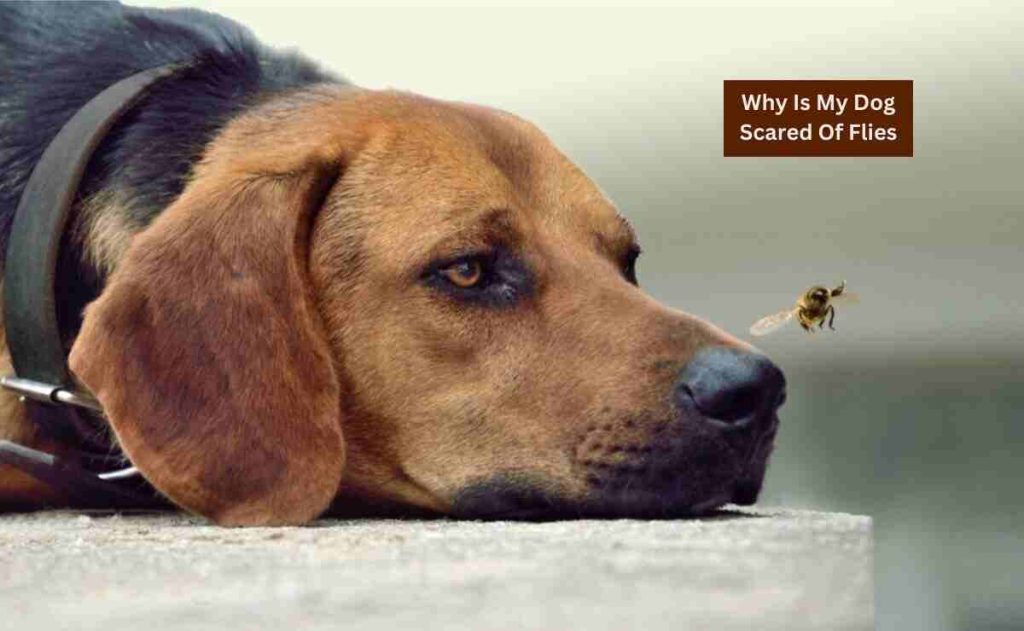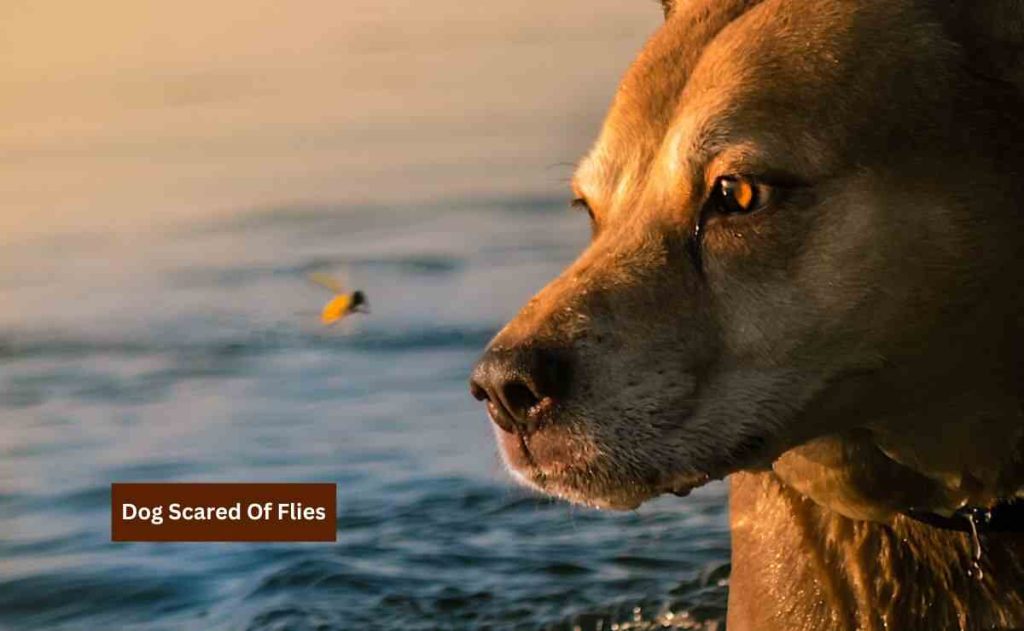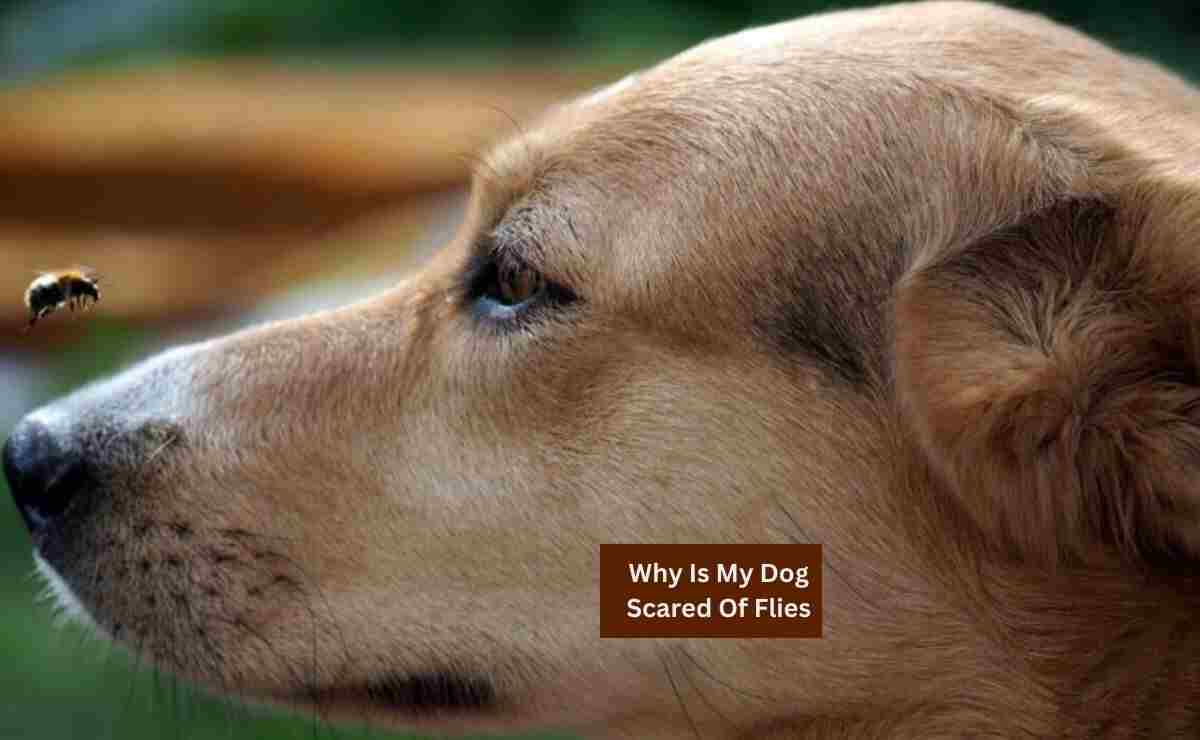Flies are tiny creatures compared to your pet dog. Though dogs are known as fearless, they can also be afraid of these insects. But why is my dog scared of flies?
Most dogs fear flies due to experiencing a traumatizing event in the past related to a fly, such as being bitten by one or chased by one. This can cause your dog to develop a fear of flies, even if it has never encountered them before. Dogs may also be scared of flies due to an innate fear of small, flying objects. Flies can also be loud and irritating, which can be a cause of fear and anxiety for dogs.
Why Is My Dog Scared Of Flies?

Dogs can exhibit fear or anxiety towards many things, and flies are no exception. While it may seem strange to us that a small insect like a fly can cause such a reaction in our canine companions, there can be several reasons:
1. Past negative experience
If your dog is scared of flies, one of the most common reasons could be bitten or chased by flies. If your dog has experienced a painful insect bite, it will be scared of it.
Moreover, if your dog has ever been chased or swarmed by flies, it can create a lasting fear response. Even for rescue dogs who have lived in environments with fly infestations, the association between flies and anxiety can persist due to negative memories from their past living situation.
In these instances, the fear of flies is a natural response that is rooted in the dog’s instinct to avoid potential threats or discomfort based on previous events.
2. Fly’s Movement
The quick movements of flies can be a reason for a dog’s fear. These insects zip around swiftly, making it challenging for dogs to predict their next move. The sudden and unpredictable nature of fly movements can trigger instinctive fear responses in dogs.
Your dog may start barking, running away, or hiding whenever they sense the presence of a fly. This reaction is a natural response to the perceived threat posed by the rapid movements of the fly. Dogs find the unpredictable flight patterns of flies unsettling, leading to these fear-induced behaviors.
3. Buzzing Sound
Another significant reason for being scared is their remarkably sensitive ears. The sound of flies is barely perceptible to humans, but dogs pick up on this irritating noise with their heightened sense of hearing. Dogs have higher levels of hearing ability than humans.
The heightened sensitivity to the buzzing sound of flies can trigger a dog’s fear. The unfamiliar noise causes them anxiety as they try to comprehend the source of the sound. Larger flies, such as horseflies or house flies, with their louder buzzing, can startle dogs even more.
4. Anxiety
Dogs exhibit a fear of flies if they suffer from general anxiety. If your dog is already suffering from anxiety or stress, the sudden presence of a fly can act as a trigger, eliciting a fear response. Anxious dogs tend to be more vigilant in perceiving potential threats, and encountering certain objects or creatures, like flies, may overwhelm them with fear.
Identifying signs of anxiety in your dog is crucial, as these may include excessive licking, trembling, panting, whining, burying their head into you, or seeking physical reassurance by wrapping their paw around you when anxious.
5. Bad Shelter Memories
If you adopt your dog from a shelter, it may have bad memories of flies that create fear.
Living in crowded and poorly maintained shelters, where personal space is limited, can be distressing for dogs.
In such environments, fly infestations are not uncommon, creating an added layer of discomfort and anxiety for the animals. When a fly enters your home, it might serve as a powerful trigger for memories associated with the challenging conditions of shelters.
For rescue dogs, who have experienced filthy and cramped living conditions, encountering flies can evoke memories of a time when their surroundings were less than ideal. The fear of flies in these cases goes beyond the immediate presence of the insect; it becomes a manifestation of past traumas.
How to Tell If Your Dog Is Scared of Flies?
If your dog is scared of flies, you can observe instant changes in their behavior. There are some signs of fear that can help you identify their discomfort
- Escape attempts
- Shaking or trembling.
- Hiding
- Ears back and tail tucked
- Hunched posture
- Whimpering
- Crying or yelping
- Excessive panting, whining, and baking.
- If you notice your dog actively avoiding or trying to avoid specific areas of the house where flies are present, it might indicate fear.
How To Prevent Your Dog From Being Scared of Flies?

If your dog is scared of flies, there are a few steps you can take to help them overcome their fear.
Create a calm space
Designate a specific area in your home as a fly-free space where your dog can feel comfortable and safe. Take preventive measures such as using screens on windows and doors, keeping the areas clean, and regularly emptying trash cans to reduce fly presence.
Desensitization
Gradually introduce your dog to flies in a controlled environment, starting indoors. Reward them for staying calm, gradually increasing the time spent near flies. Over time, this desensitization process can help them become accustomed to the presence of flies.
Reward positive behavior
Reward your dog with treats and praise when they remain calm in the presence of flies. This positive reinforcement helps them associate flies with positive experiences, making it easier for them to stay calm.
Use Insect Repellent
Apply Vaseline to your dog’s coat and ears as a simple homemade fly repellent. Alternatively, create a diluted apple cider and water mixture to spray on your dog, avoiding the face. You can also use commercial products.
If the fear of flies persists or becomes severe, it may be beneficial to consult with a professional dog trainer or behaviorist. They can provide guidance on specific techniques and strategies to help your dog overcome their fear.
Frequently Asked Questions (FAQs)
Do All Dogs Hate Flies?
Not all dogs hate flies; their reactions can vary. Larger dogs tend to be less bothered by flies than smaller breeds, as they are less easily overwhelmed by the buzzing and constant movement of the insects. However, the degree of aversion can differ among individual dogs
How Do Dogs React To Buzzing?
The buzzing sound of flies can affect dogs differently. They can twitch their ears or even run away when they sense the presence of a fly. Reacting to buzzing sounds varies as well. Some may become curious or excited due to the unfamiliar and stimulating noise, while others may feel anxious, agitated, or scared.
The reaction depends on the dog’s personality, sensitivity to noise, and any past negative experiences associated with buzzing sounds.
Conclusion
So you have got your answer. Firstly, you have to understand why dogs are afraid of flies. This allows you to address their fear more effectively.
Moreover, you can create a calm and bug-free area to cope with the situation. It will be best if you train your dog not to be scared of flies and reward him for their positive reaction.
